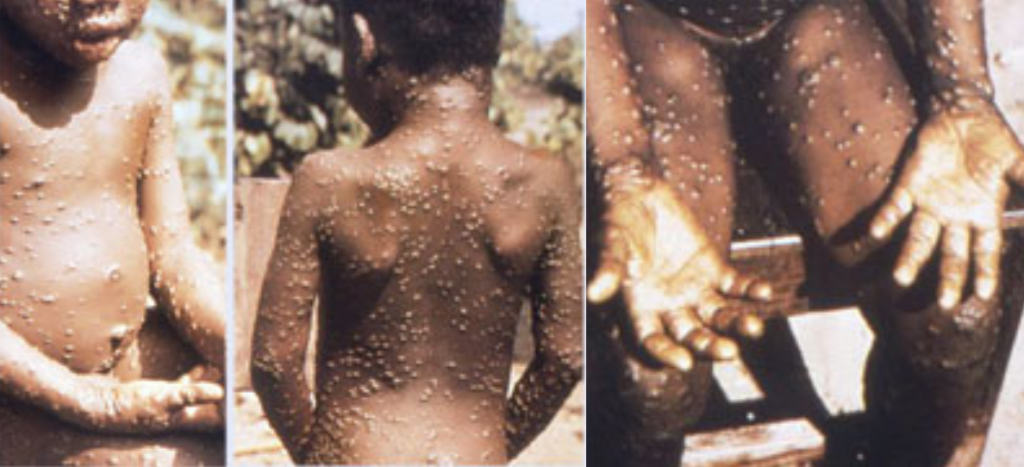Singapore Records First Case Of Monkeypox In A Nigerian Traveller

An image of the rash of monkeypox. Illustration purpose only. Source: Public Domain
By News Desk, Neucrad Health India June 3, 2019
Ministry of Health (MOH) in Singapore confirmed a case of monkeypox infection on May, 8th 2019 in a 38-year-old Nigerian national who arrived at the Lion City on 28 April 2019 to attend a workshop. He was immediately shifted to the National Centre for Infectious Diseases (NCID) and kept at an isolation ward. Right now, his condition is stable. Though the possibility of transmission of this rare disease is low, health officials have disinfected the room in Hotel 81 Orchid where he was staying and quarantined 22 other individuals who came in close contact with the patient. According to reports, the Nigerian National was working in the Delta state in Nigeria before coming to Singapore. He attended a wedding at a village in Ebonyi State, Nigeria on 21 April 2019 and consumed ‘bush meat’. It was most probably the source of transmission of the rare monkeypox virus.
What is Monkeypox?
Monkeypox is a severe infection caused by the transmission of monkeypox virus belonging to the Orthopoxvirus genus from the family Poxviridae. It is the same family of virus causing smallpox and cowpox. There are two specific genetic groups of this deadly virus- Central African and West African monkeypox virus. The symptoms caused by the former group are more severe than the latter, and there is also a high mortality rate seen in Central African monkeypox virus infection. The disease first came into light in 1958 when a colony of monkeys kept for research activities developed this disease. Since then, the condition got the name ‘monkeypox’.
When was the first incidence of Monkeypox seen in human beings?
The first human transmission of monkeypox was recorded in the Democratic Republic of Congo in 1970. Later on, there has been a sporadic occurrence of this disease among human beings in the central and western African countries. However, in 2003, there were reports of 47 cases of this infection in the United States, and 3 cases in the United Kingdom. After that, in 2018 there was one more confirmed patient of monkeypox in Israel. Though the exact mode of transmission from the animals to human beings is still not clear among scientists, recent researches suspect African rodent species to play a role in the transfer of the virus.
Symptoms of Monkeypox
The incubation period of monkeypox ranges between 5 to 21 days. The symptoms of this infection manifest in two phases. The first stage (invasion period) lasts from 0 to 5 days when patients experience fever, swelling of lymph node, excessive headache, back pain, muscle ache, and extreme lethargy. The second stage of monkeypox is known as eruption phase, which occurs 1-3 days after experiencing fever. Similar to chickenpox, various stages of the rash appear all over the body, including faces, hands, and soles of feet. It usually takes up to three weeks for the complete cure of the infection. The fatality of monkeypox in remote areas of central and west Africa can rise to 10 per cent if patients do not get immediate medical intervention.
How human beings develop Monkeypox?
Human beings can contract monkeypox through animal-bites or by direct contact with the infected animals’ body fluid. It can spread from infected human beings to healthy ones through respiratory droplets, direct contact with body fluid, and touching virus-contaminated personal belongings, including bedsheets, utensils, and clothes.
How can you prevent the transmission of Monkeypox?
Since there is no vaccine or specific treatment of monkeypox World Health Organisation (WHO) recommends limiting close contact with infected patients. WHO also advocates raising awareness among people to avoid contact with rodents and primates. Health workers should wear gloves and other protective measures while dealing with infected animals and human beings. People should also thoroughly cook meat before consumption.
Finally, we can say that, though monkeypox is much less infectious than smallpox, it can turn fatal if patients do not seek proper medical care. Whenever you notice symptoms of monkeypox do not panic, instead contact the nearest hospital for correct medical guidance.





